The pandemic, economic downturn, and global instability put great pressure on companies, revealing who is ready for the future changes. And obviously – who is not. Shifting guest expectations, unstable economy, and recent tech breakthroughs make “future-readiness” more important than ever for hospitality professionals.
What makes a short-term rental business future-ready? We took inspiration from the recent research conducted by Harvard Business Review and McKinsey. They defined characteristics, making companies not just survive but thrive in any situation, especially by scaling up for future opportunities. The findings fit right in our sector – for property managers and rental owners. They are: knowing what you stand for, moving quickly and increasing the ability to learn, innovate and seek good ideas. It is about who you are, how you operate and how you grow.
We invited two innovative CEOs who have successfully built their short-term rental businesses. And they continue to evolve their rental companies to meet the demands of tomorrow. Learn from their experience and strategies to make your business more adaptable and grow in the constantly evolving short-term rental market.
Speakers
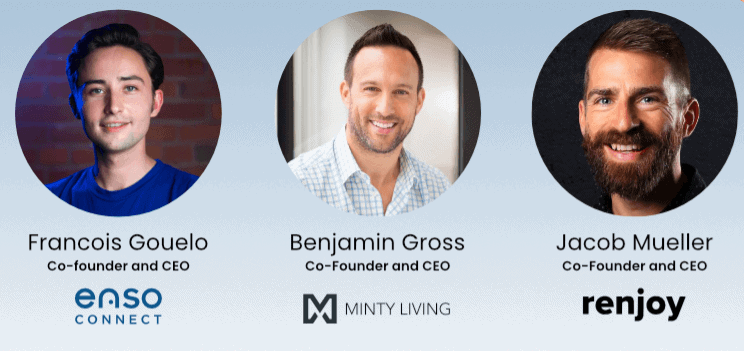
Francois Gouelo
CoFounder & CEO, Enso Connect
As the Co-Founder and CEO of Enso Connect, Francois has been at the forefront of integrating technology with hospitality. With his extensive expertise and visionary leadership, he has played a pivotal role in advancing innovations that enhance the guest experience and streamline hospitality operations.
In his role as moderator, Francois will facilitate the session, bringing his deep knowledge and experience to ensure a productive and engaging discussion. He is committed to addressing all questions from the audience, fostering a dynamic exchange of ideas, and providing valuable insights. His leadership in moderating the session underscores his dedication to bridging technology and hospitality, ensuring that all participants gain a comprehensive understanding of the topic at hand.
Benjamin Gross
Co-Founder and CEO of Minty Living
With a Master’s degree in Mathematical Finance, Benjamin brings a profound passion for tackling complex problems, which is evident from his background in quantitative trading and data science. His analytical skills and strategic mindset have been instrumental in his success.
In April 2020, Benjamin and his spouse founded Minty Living, a property management company that has experienced remarkable growth under his leadership. In just three years, the company has expanded its portfolio from 5 properties to an impressive 180 properties. This rapid growth is a testament to Benjamin’s innovative approach and his ability to leverage Atlanta, Georgia’s thriving film industry, which has fueled the demand for high-quality property management services.
Benjamin’s expertise in data-driven decision-making and his dedication to excellence have positioned Minty Living as a prominent player in the property management sector, showcasing his ability to turn complex challenges into opportunities for success.
About Minty Living
Minty Living has evolved into a distinguished professional vacation rental management company, with a strong focus on exceptional design and enhancing the guest experience. Recognizing the importance of technology in driving growth, the company has made significant investments in advanced tools and systems to streamline operations and elevate service quality.
These technological advancements have supported Minty Living’s impressive expansion and have been pivotal in maintaining high standards of property management. In recognition of their achievements and innovation, Minty Living was nominated for the prestigious Shortyz Award for Urban Property Manager of the Year in 2023. This nomination highlights the company’s commitment to excellence and its impact on the vacation rental industry, reflecting the successful integration of cutting-edge technology and a guest-centered approach.
Jacob Mueller
Co-Founder and CEO of Renjoy
Jacob is a seasoned real estate investor and professional with a rich background in real estate, marketing, and software, accumulating over a decade of experience in both residential and commercial properties. Based in the Pikes Peak region, he operates as a licensed broker and the owner of Renjoy, a firm dedicated to helping clients achieve their long-term investment goals.
Jacob’s extensive expertise extends beyond traditional real estate transactions; he is committed to transforming perceptions in the industry. By advocating for greater knowledge and accountability, he aims to bridge the wealth gap and foster growth within the investment community. His approach is rooted in providing insightful guidance and promoting responsible investment practices, reflecting his dedication to empowering clients and advancing the field of real estate investment.
About Renjoy
Jacob transitioned into the vacation rental business from a background in real estate investment, where he initially focused on flipping properties. Recognizing the emerging opportunities in short-term rentals, he teamed up with his co-founders to explore this dynamic market. Their collaboration led to the launch of Renjoy in late 2021, a company dedicated to capitalizing on the potential of vacation rentals.
Since its inception, Renjoy has grown to manage approximately 160 units. Jacob and his team emphasize leveraging technology to drive growth and streamline property management processes. Their focus on integrating advanced tools and systems ensures efficient maintenance and enhances the overall guest experience, positioning Renjoy as a forward-thinking player in the vacation rental industry.
“Efficiency is crucial in managing many different short-term rental properties. Since every property, guest, and owner is unique, it’s like running 160 separate small hotels.”
Watch the full webinar recording
What makes a Hospitality company future-ready?
We’ve asked hospitality industry leaders to share their vision of preparing businesses for the future in the short-term rental space. Benjamin Gross and Jacob Mueller, have shred their insight based on years of experience in the STR market. They name five characteristics: clear business vision, fluid tech stack, diversified revenue streams, a tech-savvy team, proper data warehousing.
Get clear on what you’re building
Start with your end in mind. Building a small, profitable rental business requires a different strategy than expanding to manage thousands of units. Just as in tech development, where initial solutions often undergo revisions and improvements, your approach should evolve as your goals become clearer.
Begin by defining your ultimate objective, whether it’s establishing a highly profitable niche rental business or scaling to a large portfolio. This clarity will guide your decisions and help you tailor your strategies accordingly.
Optimize your operations towards this North Star by setting clear Objectives and Key Results (OKRs) for your roadmap. Develop a structured plan for the next 3, 6, and 12 months, focusing on incremental goals that align with your long-term vision. Regularly review and adjust your OKRs based on performance and feedback to stay on track and adapt to changing circumstances.
By maintaining a clear vision and strategically aligning your efforts, you can effectively build and scale your rental business, ensuring that each step contributes towards achieving your overarching goals.
Then you go through a pretty substantial technology due diligence process. At the end of the day, choosing the wrong technology can set you back months and months and months.
Benjamin Gross, Minty Living
Keep your tech stack fluid – avoid rigid processes
Your technology needs will vary greatly based on your scale, so it’s crucial to plan for this variability from the start. In the rapidly evolving short-term rental industry, technology that works for a small operation may not suffice as your business scales.
As your company grows, be prepared to adapt and enhance your technology choices to match your expanding needs. Initially, you might start with basic tools and platforms, but as you increase your portfolio and operations become more complex, you’ll need more advanced solutions to manage reservations, streamline communication, and analyze data effectively.
Regularly assess your technology stack to ensure it aligns with your current scale and future growth plans. Investing in scalable and flexible solutions can prevent disruptions and facilitate a smoother transition as your business evolves. Staying ahead of technological advancements and being open to upgrading your systems will support long-term success and help you maintain a competitive edge in the dynamic short-term rental market.
Identify revenue streams to counter costs
Running a business involves managing variable costs that fluctuate with changing conditions, such as occupancy rates, seasonal demands, or maintenance needs. To ensure financial stability, it’s highly valuable to identify revenue streams that can move independently or even inversely to these fluctuations.
By diversifying your revenue sources, you can create a buffer against the volatility of your primary income. For instance, consider implementing additional services or amenities that generate income regardless of occupancy rates, such as offering premium cleaning services, partnering with local businesses for exclusive guest discounts, or leveraging dynamic pricing strategies.
Additionally, exploring alternative revenue streams like subscription models, long-term rentals, or seasonal packages can help balance out the impact of variable costs. By strategically aligning your revenue streams to counteract or complement cost fluctuations, you can enhance your business’s financial resilience and maintain a more predictable cash flow.
Create a future-ready team
Seek tech-savvy employees, not necessarily developers, but those who can independently handle tasks like onboarding and using tools like Slack. In a startup environment, without formal HR processes, these skills are essential. Team members often directly contribute to product development, so being adept with technology is crucial.
Look for team members who are process-oriented and empathetic, considering problems from others’ perspectives, whether clients, colleagues, or guests. They start with the problem and work backwards to find solutions, focusing on a systematic, project-based approach.
For human capital, use the same reverse engineering principle of where you want to be. For luxury services, look for those who can provide a hotel experience in your team. Guest experience must be handed to somebody who we know can take real ownership of these issues.
Book recommendation by the speakers: “Buy Back Your Time.”
Build a future-proof tech stack
Our speakers have kindly agreed to share and comment on their tech stacks that are their clear competitive edge. They dived into how they do market research, manage guest communication, collect data points, preparing the business for artificial intelligence. They shared online platforms they use for distribution and how they drive the business for more direct bookings. Each of the companies has a different business strategy and have built unique systems to achieve their goals. Learn more about building an optimized tech stack for your hospitality business.
Vacation Rental Tech Stack Checklist - Download
Minty Living Tech Stack
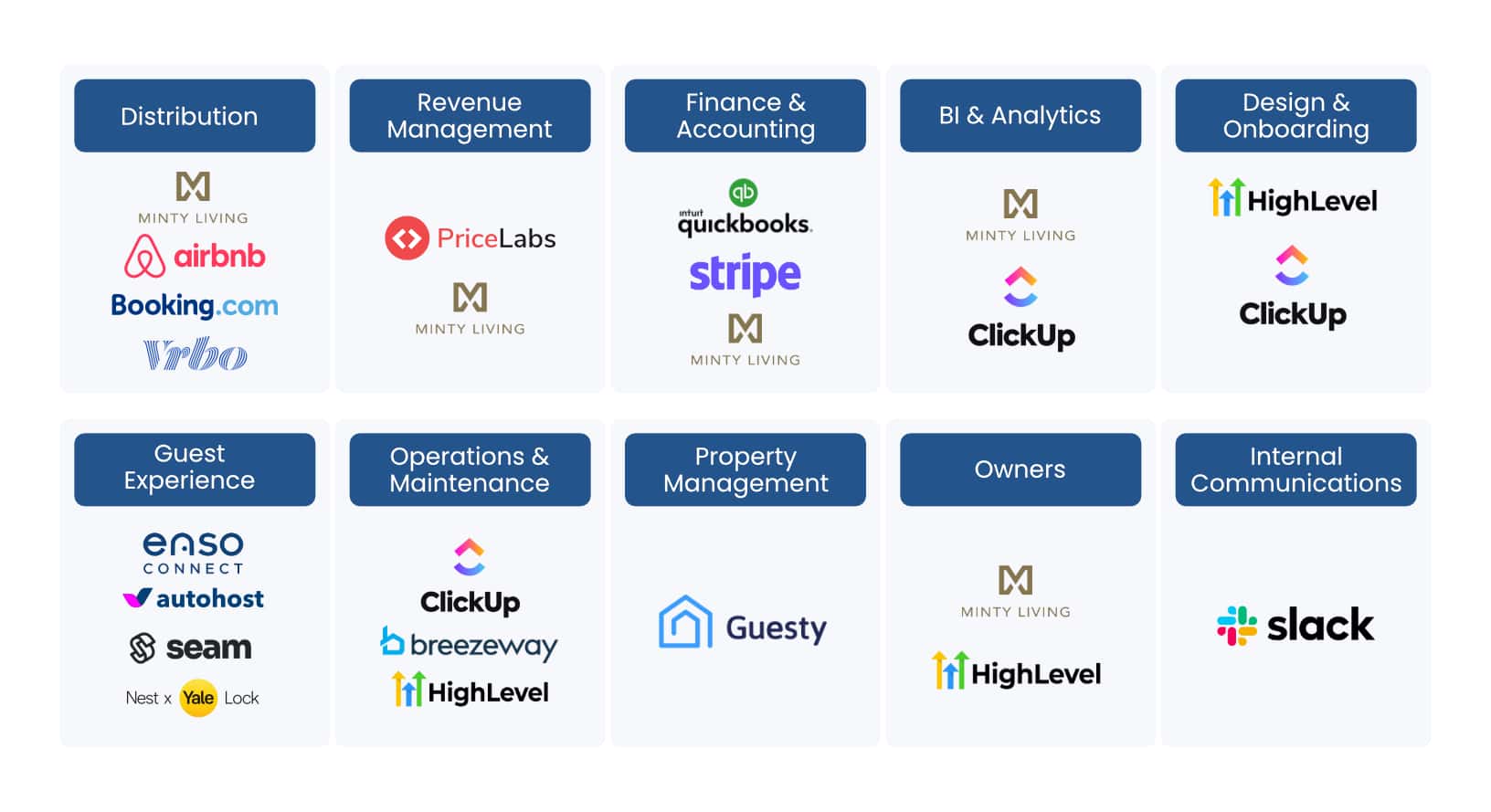
Task management system
As an urban-focused vacation rental manager, managing tasks efficiently is key for Minty Living. We need high-quality performance and effective task management in a physical space. After trying various tools like Trello and Notion, we found ClickUp in late 2021. It proved to be a flexible and comprehensive task management tool that integrates well with our systems, enhancing our overall efficiency.
Event-driven sequences
In our data-driven world, we track a series of events for each task. For example, when Jenny reports a broken toilet, we follow the entire process: receiving her request, assigning it to a vendor, scheduling the repair, completing the task, and getting Jenny’s feedback. It’s not just about fixing the toilet; it’s about tracking and evaluating each step in the process.
We realized that no existing tool offered the event-driven architecture we needed, so we built it from scratch using AWS. This allowed us to separate our data into highly available parts, like our bespoke online booking system for extended stays, and other parts for later analysis. Our goal wasn’t to be a small-scale vacation rental manager but to create a platform capable of handling thousands of units. After thoroughly testing various systems, we’re confident and proud of the robust architecture we’ve developed.
Renjoy Tech Stack
“Building a system for real-world work goes beyond just software. It involves managing relationships with real people, like vendors. For example, convincing someone like Jonathan to use a tool like ClickUp requires showing him the benefits of working with you. It’s not just about technology; it’s about daily, on-the-ground problem-solving and interacting with people to address the numerous issues that arise in property management.” (Jacob)
Switching Tools:
Initially, we weren’t clear about our tech strategy, leading us to frequently switch tools. This process was time-consuming and expensive.
Data as a Priority:
We’ve realized the importance of data control. While Property Management Systems (PMS) play a significant role, they often limit innovation due to their industry-specific focus.
Industry-Agnostic Tools:
We found that using industry-agnostic tools allows for more innovation. This approach lets us integrate broader solutions, like ClickUp for task management, which isn’t possible with typical PMS tools.
Flexibility in Data Management:
For instance, using a tool like ClickUp, which isn’t designed specifically for vacation rental management, gives us more control and flexibility over our data and tasks, unlike some PMS tools that are less effective for our needs. Therefore, we store our data in a way that allows us to use various tools more effectively.
Controlling VS Connecting the Data
Minty Living data connection
Today it’s not about who’s controlling that data, but about who’s connecting that data with all of the right systems. Because there is no all-in-one that does absolutely everything perfectly.
In vacation rental tech, there are two strategies. One is all-in-one, like Track, Streamline, and Guesty. The other focuses on specific tasks, such as lock control or communication. However, integrating these specialized functions can be tough. It often results in a complicated and confusing system for property owners and CEOs.
“This fragmentation causes “brain damage” for owners and CEOs that have to figure out how to hook this stuff up. If all you do is locks, how am I communicating that to the guest? That then has to be in our PMS and all of a sudden, you’re stuck with this spaghetti that you’ve got to figure out how to glue the ends together.” (Ben)
We at Minty Living were excited to partner with Enso Connect because they integrated key functions like locks, communication, user apps, and upsells into one app. This approach, which combines various functionalities, is what we believe will be the future trend in technology. Instead of using separate apps for each function, this method allows us to use fewer apps, making our system more efficient and less complicated.
Renjoy data connection
It’s like a network where different elements, like locks, are connected and serve various people, from guests to employees. These connections link to various tasks and communications. Imagine several small hubs, each handling different functions, but all linked to the central data. This data needs to be accessible and compatible with multiple tools that handle diverse types of information.
And this is actually why we use Guesty. What we love about it is that their API is so open. So open and super clean. It’s clean, it’s open, it’s easy for us to use. And a lot of people like to integrate with Guesty because it’s so easy. And so that gives us access to a lot of innovation. And for us, API functionality was paramount during the due diligence process.
Webhooks and Data Warehousing in Hospitality Systems
What are webhooks?
Webhooks work like this: imagine ordering a pizza and waiting for the doorbell to ring instead of calling to check if it’s arrived. Similarly, webhooks automatically send data from one system to another instantly when a specific event happens.
The introduction of webhooks fits well with how we manage vacation rentals. It’s about tracking events as they happen, saving that data, and then starting a new sequence of events based on that.
Example of Using Webhooks to Collect Data
Minty Living made sure to collect comprehensive data. If you’re aiming to manage a small, profitable vacation rental business, focus on simple tech solutions and good management to maximize profits. In contrast, Minty Living’s goal involves measuring performance across multiple locations. For example, they compare how long it takes to schedule tasks in different cities. Tzhis detailed tracking is essential for managing properties in various places.
The second challenge is getting apps to share their data effectively. Enso Connect uses webhooks, which is becoming more common, but not all apps offer this. Often, the data displayed in an app differs from what’s available through its API, leading to limited access to data. Creating a global view of your data is an incredibly valuable thing.
Centralizing Hospitality Business Data in Airtable
Renjoy use Airtable for everything, not just property data. It includes our CRM, project management, vendor details, room specifics, item replacements, and even our marketing campaigns. With all data centralized in Airtable, they can easily visualize different aspects like sales, properties, onboarding, finance, and housekeeping on one platform. This makes it highly useful for our entire company’s operations.
Renjoy have many interactions between their database and Guesty. They clearly mark these interactions in their database, so it’s easy to track how data about properties, guests, and guidebooks moves between their systems and tools.
For data warehousing, ideally, you’d use a SQL database for full control over your data. However, this can be costly as it requires skilled administrators. Renjoy couldn’t afford this, so they chose a data visualization tool that works well with Airtable instead.
Betting on AI
In the future, AI might change how we handle data. AI can organize unstructured, real-world data, like turning a room’s video into digital information. This means we won’t need to structure data manually. We’re considering keeping all our historical data in one place, making it easier for AI tools to access and use it, both internally and externally. Eventually, AI might even build and manage our databases for us.
Francois pointed out that organizing data helps improve accuracy. Simple categorization, like identifying data types or locations, enhances precision. This organization can lead to more effective AI assistants, reducing the need for complex dashboards and allowing for simpler queries through a chat box.
Changing Google search: from list of blue links to one answer in ChatGPT
There’s a change in how we search for information, like using ChatGPT for straightforward answers instead of Google, which often shows ads and videos. This shift affects how we view and control our data, making it easier to switch between different technologies effectively.
Guest Screening and Verification Tips: Minty Living
Minty Living has developed a thorough guest screening process, especially important in Atlanta due to high fraud rates and squatter laws. Using Enso Connect, they’ve created detailed screening flows. For instance, Airbnb guests must still provide a selfie and ID, as some Airbnb accounts have been compromised. This highlights the need for industry discussions on best practices. Their system tailors screening based on the booking channel, time between booking and check-in, stay duration, and property type, adjusting the risk assessment for different scenarios.
Risk-Based Approach for Guest Screening: Renjoy
Renjoy uses a risk-based approach for guest screening. They assess each booking’s risk using various factors and then follow up accordingly. This might include requesting ID and credit card photos, especially from non-Airbnb guests, and having them sign rental agreements. Learning from experiences, especially the challenging ones, helps improve their screening process. They focus more on preventing credit card fraud and chargebacks. Understanding the unique risks for each property is key, and they tailor their screening methods accordingly.
Best Practices for Guest Screening and Verification: Enso Connect
One effective tip is offering guests a choice between a damage waiver and a safety deposit, called ‘Flex.’ This can increase revenue and self-insure your property without extra fees. They can opt for a safety deposit, verified through their credit card. It’s better to hold the deposit rather than charge it to avoid Stripe fees. This flexible approach offers various options for property protection.
See how Enso Connect can optimize your tech stack for future-proofing your business.
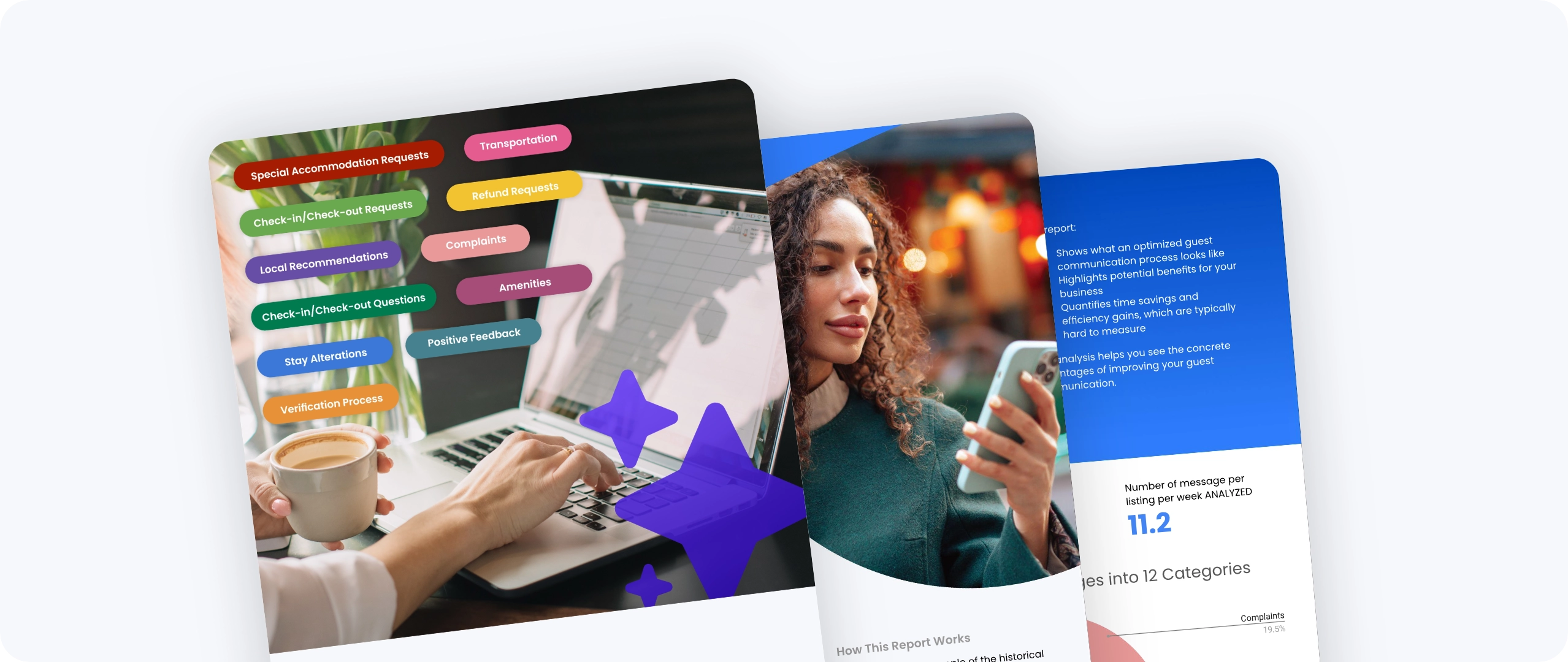

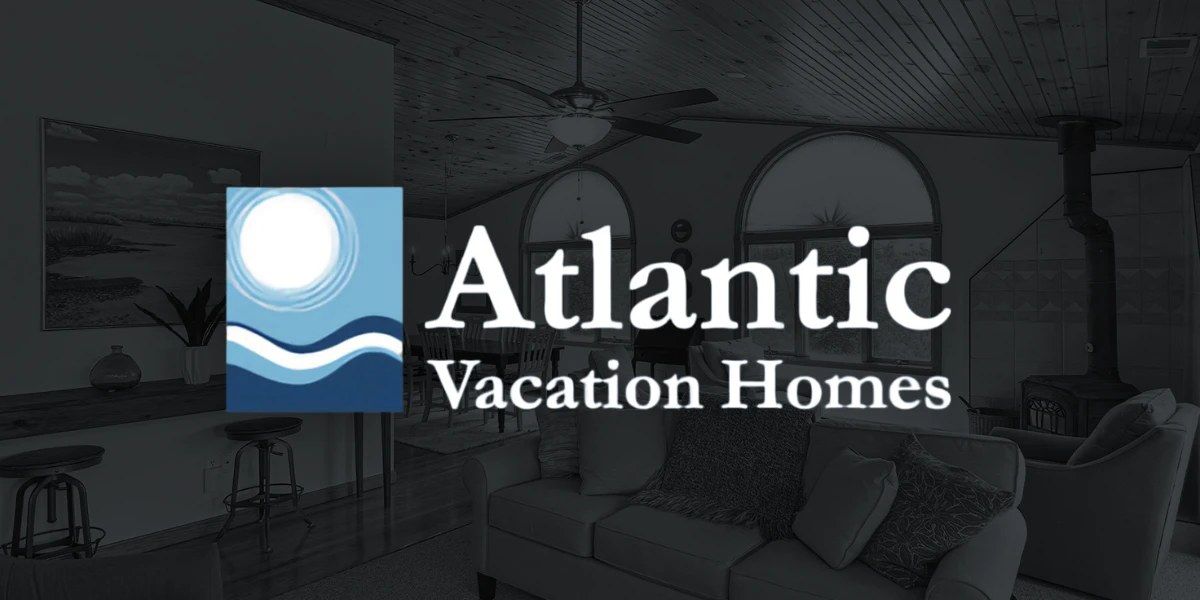

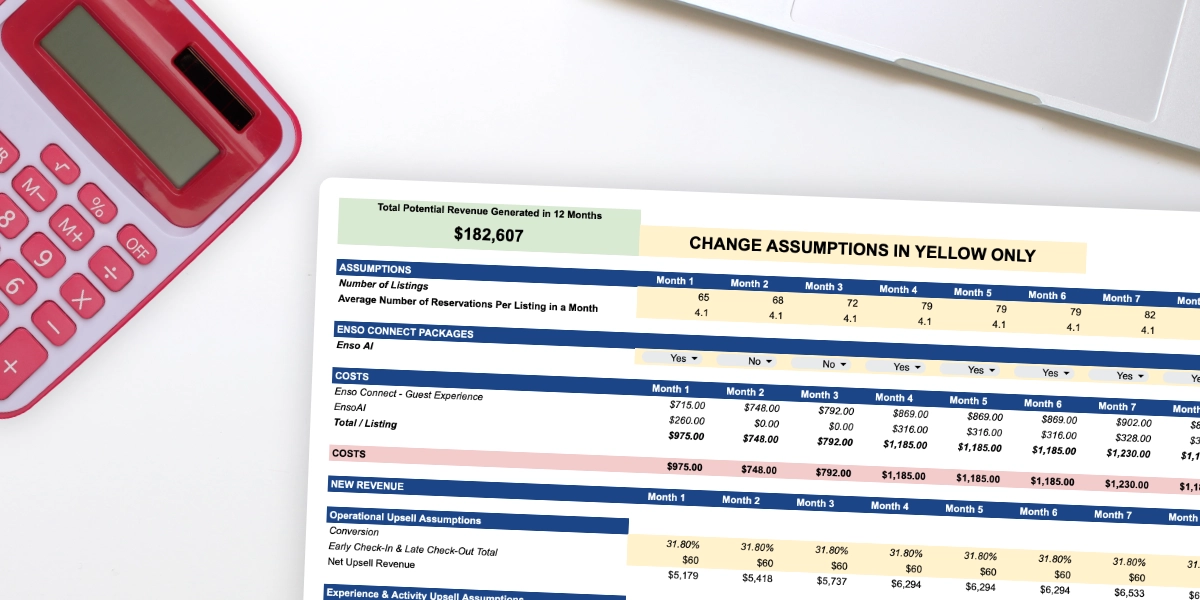
![Future Ready Short-Term Rental Business [Webinar]](https://gcamkobrlepn-u2971.pressidiumcdn.com/wp-content/uploads/2023/12/2023-December-Webinar-Graphic-Blog-Header.webp)